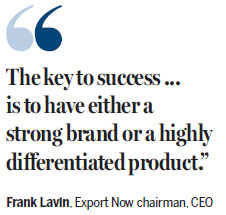Small firms can win in e-commerce
Updated: 2015-06-11 11:21
By Paul Welitzkin in New York(China Daily USA)
|
||||||||
China's e-commerce market is now larger than the US', and a former American diplomat believes US companies regardless of size can compete and thrive in the Chinese online marketplace.
Frank Lavin, chairman and CEO of Export Now, said that even small US companies (fewer than 10 employees) can enter the Chinese online market on a cost-effective basis. Lavin will speak at a conference Thursday at the University of Southern California US-China Institute on how US brands can win in China's e-commerce market.
"The key is to outsource core functions," he wrote in an e-mail. "My company can handle tasks from import logistics to order fulfillment to financial settlement. So a US company can run a China e-commerce store without putting one employee in China."
Fueled by a growing middle class, online product availability and an improved mobile commerce infrastructure, management consultant AT Kearney said that online shopping in China jumped from $21 billion in 2008 to about $300 billion in 2013. Forrester Research estimates that figure reached $440 billion in 2014 and will continue to grow, reaching $1 trillion by 2019.
Lavin was US ambassador to Singapore from 2001 to 2005 and undersecretary of commerce for Asia and the Pacific from 2005 to 2007. His firm believes that e-commerce is the least expensive way to enter the Chinese market to sell directly to Chinese consumers.

Forrester said China's e-commerce market is currently dominated by two websites, Alibaba's Tmall and JD.com, which hold a 57 percent and 21 percent share of the B2C (business-to-consumer) market, respectively.
Even though no partnership is legally required, " in our view US companies will enjoy greater success if they work with an established China platform such as Tmall or JD.com," Lavin said.
AT Kearney said that more than half of China's Internet users access the Internet with a mobile phone. Last year, 25 percent of respondents told Forrester they shop on mobile phones at least weekly, with 15 percent logging on daily and 4 percent several times a day.
Lavin said there are two key areas that US companies need to focus on when entering the Chinese market.
"The key to success in that market is to have either a strong brand (think Nike or Levi's) or a highly differentiated product (like the NFL). In other words, try to avoid head-to-head competition with established local brands, and emphasize the premium or specialty segments of the market, where US brands can dominate," he added.
Lavin said being fluent in Mandarin or having a deep knowledge of China isn't required to successfully compete on the mainland. "Our specialty is to work with companies that have great brands, but no China capabilities - that is what we build out for them. Now a US company can run its China e-commerce store without leaving its desk in the US," he said.
paulwelitzkin@chinadailyusa.com

 Top 10 investor countries and regions
Top 10 investor countries and regions
 Beijing showcases Olympic exhibits and visions
Beijing showcases Olympic exhibits and visions
 Ten photos you don't wanna miss - June 11
Ten photos you don't wanna miss - June 11
 Youth of today in Sudan
Youth of today in Sudan
 EU sanctions hamper Italian-Russian commercial ties: Putin
EU sanctions hamper Italian-Russian commercial ties: Putin
 Across Canada(June 11)
Across Canada(June 11)
 US dollar inspired art to be auctioned at Sotherby
US dollar inspired art to be auctioned at Sotherby
 Coffee shop where Premier Li met entrepreneurs
Coffee shop where Premier Li met entrepreneurs
Most Viewed
Editor's Picks

|

|

|

|

|

|
Today's Top News
Pentagon to greet General from China
Suu Kyi begins groundbreaking visit
Michelle Kwan to work for Hillary Clinton campaign
China, US take fresh views on TPP and AIIB
G7 accused of ignoring the facts over South China Sea
Obama weighs sending several hundred more US troops to Iraq
MSCI delays including China A shares in benchmark index
7 Chinese gay couples hold wedding ceremony in West Hollywood
US Weekly

|

|







